|
24/5/2014 Perennial Cropping: Silvopasture meets Forest Gardening meets Keyline Design ( soon to meet Holistic Management!)Read Now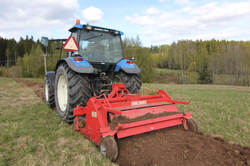 This article documents the major patterning of the farm at Ridgedale PERMACULTURE as we laid the Keyline tree lanes and planted thousands of long term perennial crops within our pasture lanes. For a better introduction to the farm's context you can read an article here. Water systems and Keyline patterning is also addressed here. The original plan for the tree layers of the farm design is outlined in another article available here. So now we explain & assess the actual implementation. For context, at the time of this work we ourselves had only been on site for 6 weeks and the planning, layout, machine work and major planting all took place in Week 1 and 2 of our 10 Week Internship. (We have another 10 Week Internship program running July- Sept)
2 Comments
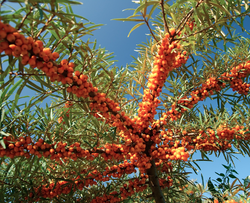 Hippophae rhamnoides, Sea Buckthorn Hippophae rhamnoides, Sea Buckthorn We can think of at least 180 great forest garden & perennial crops for cold climate Sweden. Want to hear about them? Over the course of the next year we will profile 5 a week on the blog. Perennial plants and crops offer a low energy, oil & resource input based foundation for future-proof agricultures. By default if an agriculture is to be called regenerative the bottom line is that it must be soil building, not soil depleting. Relentless deep tillage & poor soil husbandry (wifery?!) contributes to the majority of the 24 billion tons of topsoil lost every year on planet water. We are going to be focused on holistic polyculture grazing and perennial production at ridgedale over most of the site as this represents the most effective way to restore our degraded landscape, produce high value produce and ensure the future resource base we are managing holistically for in our decision making. 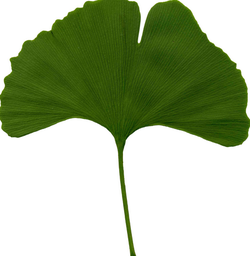 Ginkgo biloba, ginkgo Ginkgo biloba, ginkgo We can think of at least 180 great forest garden & perennial crops for cold climate Sweden. Want to hear about them? Over the course of the next year we will profile 5 a week on the blog. Perennial plants and crops offer a low energy, oil & resource input based foundation for future-proof agricultures. By default if an agriculture is to be called regenerative the bottom line is that it must be soil building, not soil depleting. Relentless deep tillage & poor soil husbandry (wifery?!) contributes to the majority of the 24 billion tons of topsoil lost every year on planet water. We are going to be focused on holistic polyculture grazing and perennial production at ridgedale over most of the site as this represents the most effective way to restore our degraded landscape, produce high value produce and ensure the future resource base we are managing holistically for in our decision making. 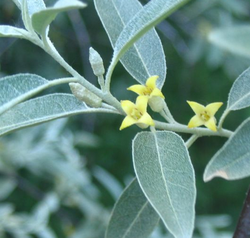 We can think of at least 180 great forest garden & perennial crops for cold climate Sweden. Want to hear about them? Over the course of the next year we will profile 5 a week on the blog. Perennial plants and crops offer a low energy, oil & resource input based foundation for future-proof agricultures. By default if an agriculture is to be called regenerative the bottom line is that it must be soil building, not soil depleting. Relentless deep tillage & poor soil husbandry (wifery?!) contributes to the majority of the 24 billion tons of topsoil lost every year on planet water. We are going to be focused on holistic polyculture grazing and perennial production at ridgedale over most of the site as this represents the most effective way to restore our degraded landscape, produce high value produce and ensure the future resource base we are managing holistically for in our decision making. 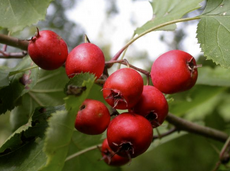 Crataegus ellwangeriana, hawthorn Crataegus ellwangeriana, hawthorn We can think of at least 180 great forest garden & perennial crops for cold climate Sweden. Want to hear about them? Over the course of the next year we will profile 5 a week on the blog. Perennial plants and crops offer a low energy, oil & resource input based foundation for future-proof agricultures. By default if an agriculture is to be called regenerative the bottom line is that it must be soil building, not soil depleting. Relentless deep tillage & poor soil husbandry (wifery?!) contributes to the majority of the 24 billion tons of topsoil lost every year on planet water. We are going to be focused on holistic polyculture grazing and perennial production at ridgedale over most of the site as this represents the most effective way to restore our degraded landscape, produce high value produce and ensure the future resource base we are managing holistically for in our decision making. 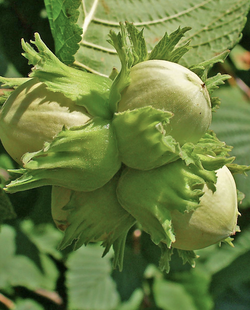 Corylus spp. (here avellana), hazel Corylus spp. (here avellana), hazel We can think of at least 180 great forest garden & perennial crops for cold climate Sweden. Want to hear about them? Over the course of the next year we will profile 5 a week on the blog. Perennial plants and crops offer a low energy, oil & resource input based foundation for future-proof agricultures. By default if an agriculture is to be called regenerative the bottom line is that it must be soil building, not soil depleting. Relentless deep tillage & poor soil husbandry (wifery?!) contributes to the majority of the 24 billion tons of topsoil lost every year on planet water. We are going to be focused on holistic polyculture grazing and perennial production at ridgedale over most of the site as this represents the most effective way to restore our degraded landscape, produce high value produce and ensure the future resource base we are managing holistically for in our decision making. This is the third of a series of articles looking at design considerations for our Cold Climate Permaculture site using the Keyline Scale of Permanence as a organizing framework, as well as an informative read for anyone interested.
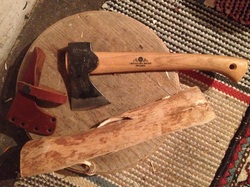 There's something about cutting and chopping firewood by hand that is sublimely pleasurable, and after all, whomever cuts firewood warms themselves twice. Good tools are always worth investing in, and time and time again experience shows it's often cheaper to spend more initially! We're loving the awesome quality of Gränsfors Bruk axes, made here in Sweden and sold internationally. Hand made, individual craftsman marked and guaranteed for 20 years, these are tools we can highly recommend.
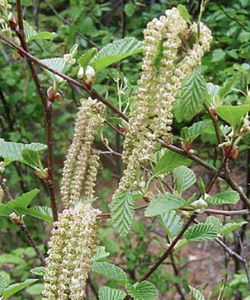 Alnus sinuata, Sitka alder Alnus sinuata, Sitka alder We can think of at least 180 great forest garden & perennial crops for cold climate Sweden. Want to hear about them? Over the course of the next year we will profile 5 a week on the blog. Perennial plants and crops offer a low energy, oil & resource input based foundation for future-proof agricultures. By default if an agriculture is to be called regenerative the bottom line is that it must be soil building, not soil depleting. Relentless deep tillage & poor soil husbandry (wifery?!) contributes to the majority of the 24 billion tons of topsoil lost every year on planet water. We are going to be focused on holistic polyculture grazing and perennial production at ridgedale over most of the site as this represents the most effective way to restore our degraded landscape, produce high value produce and ensure the future resource base we are managing holistically for in our decision making. 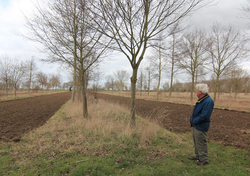 Having had the pleasure of visiting and researching some of the best agroforestry sites in Europe I thought some folks might enjoy this interview I filmed with Professer Martin Wolf over in Suffolk, UK. The video is probably far too slow if you suffer a 3-minute-social-media-saturated-attention-span but personally I would happily sit and listen to Martin for hours. The video begins with Martin recounting his work as a grain disease specialist at Cambrige University- which led to broad scale East German adoption of multi- variety grain production and subsequent huge reductions in fungicides (which quickly fell apart when the wall came down) 350,000 ha under this production system in Germany sadly fell to 20,000ha almost overnight. 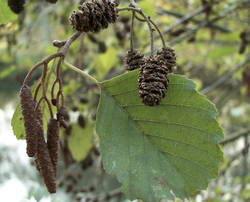 Alnus glutinosa, European Alder Alnus glutinosa, European Alder We can think of at least 180 great forest garden & perennial crops for cold climate Sweden. Want to hear about them? Over the course of the next year we will profile 5 a week on the blog. Perennial plants and crops offer a low energy, oil & resource input based foundation for future-proof agricultures. By default if an agriculture is to be called regenerative the bottom line is that it must be soil building, not soil depleting. Relentless deep tillage & poor soil husbandry (wifery?!) contributes to the majority of the 24 billion tons of topsoil lost every year on planet water. We are going to be focused on holistic polyculture grazing and perennial production at ridgedale over most of the site as this represents the most effective way to restore our degraded landscape, produce high value produce and ensure the future resource base we are managing holistically for in our decision making. Humans spent many thousands of years breeding out grasses into the staple grain crops we are addicted to in the majority of our global diets today. The problems with corporate, monocultural, machine, oil, energy, capital & resource intensive annual- based agriculture are self- evident looking at the state of soils, communities & economies globally. Perennial plants have the potential to restore degraded ecosystems and provide for our basic carbohydrate needs with much lower external inputs. Badgersett are doing awesome work in the US breeding out hardy and disease resistant Hazel & Chestnut (amongst others). Future-proof farming will incorporate a lot more solid perennial crops and holistically managed grazing systems, it's why we are designing our farm primarily around these systems. We need a lot more advocation and incentives for people working to breed up productive hardy lines here in Scandinavia. This video shows a chestnut product developed by Badgersett- a polenta that is steamed, extruded in a "ricer", then dried; can be used like either corn meal or whole wheat flour, is gluten free, and will keep for a full year at room temperature. Work involved is about the same as canning tomatoes. 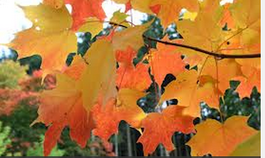 Acer saccharum, The Sugar Maple Acer saccharum, The Sugar Maple We can think of at least 180 great forest garden & perennial crops for cold climate Sweden. Want to hear about them? Over the course of the next year we will profile 5 a week on the blog. Perennial plants and crops offer a low energy, oil & resource input based foundation for future-proof agricultures. By default if an agriculture is to be called regenerative the bottom line is that it must be soil building, not soil depleting. Relentless deep tillage & poor soil husbandry (wifery?!) contributes to the majority of the 24 billion tons of topsoil lost every year on planet water. We are going to be focused on holistic polyculture grazing and perennial production at ridgedale over most of the site as this represents the most effective way to restore our degraded landscape, produce high value produce and ensure the future resource base we are managing holistically for in our decision making. |
Details
Like us on FB Below for regular updatesStay up to date with customized updates you want to receive
Upcoming coursesArchives
December 2016
Categories
All
|
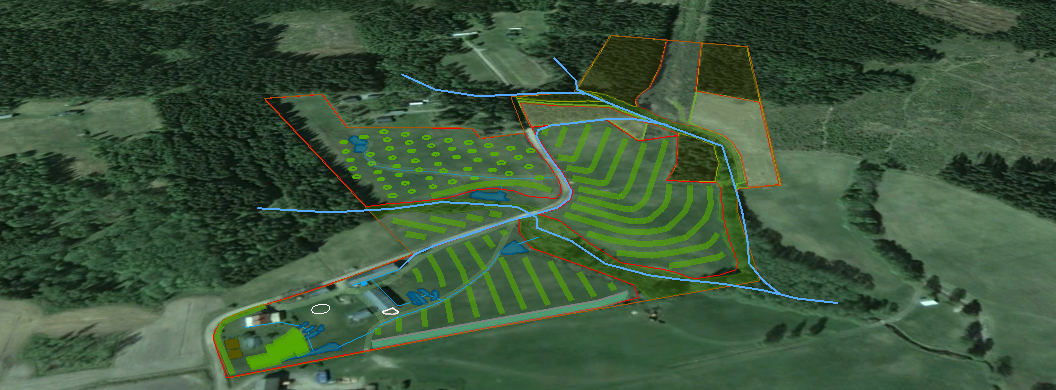

 RSS Feed
RSS Feed